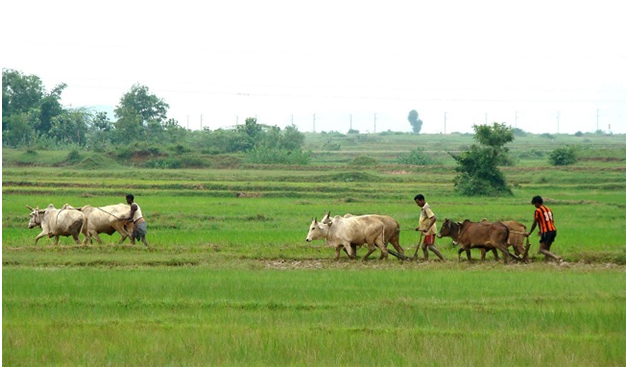
Odisha is a major agricultural state of India. The agriculture sector contributes only about 30% of the Gross State Domestic Product (GSDP), with more than 60% population dependence resulting in low per capita income in the farm sector. The cropped area is about 87.46 lakh hectares out of which 18.79 lakh hectares are irrigated. Climate and soil play a vital role in Odisha's agriculture economy. Thus a major portion of the farm land depends on rain for water feeding the crop. The rivers of Odisha are mostly rain fed, many times it happens that the farmers have to be dependent on the irrigation and as a result of it major parts of the overall cultivated land are being irrigated.
Agriculture is a vital sector and a major indicator of the state's economic status, agriculture remains the mainstay of Odisha's economy and sustenance of the life of the people. The common crops cultivated in the state are rice, pulses, oil seeds, jute, roselle, sugarcane, coconut and turmeric are important crops. The sate contributes one-tenth of the rice production in India. Apart from food grains various cash crops like jute, mesta, sugarcane, tobacco, rubber, tea, coffee and turmeric are also cultivated in the state.
Joining OSVSWA Work Camp on the Agriculture is a great way to give back to the community while learning about organic farming practices.
This is exactly what the gap year travelers joining for better agriculture / horticulture farming. During the stay of volunteers in the work camp, volunteers will be working in a organic farm for cultivation of organic vegetables, support in farming, harvest vegetables, rice, maintaining orchards and flower gardens. Alongside the harvesting tasks, volunteers will clean the vegetables and make them ready for consumers in the market, as the farm sells its products at different stores and organic shops around the country.
At the organic farm site, you will be involved in a variety of tasks. These include:
• The organic farming process
• The sustainable use of resources
• Crop rotation and pest control
• Types of compost and the decomposition process
The volunteer will also be engaged in digging fish pond in villages, and collection – processing – packaging of honey.
Around the farm there are nascent forests that can be maintained and cleaned if the harvesting jobs are done. Volunteers need motivation to work mainly outdoors doing very physical labour and under ever changing weather conditions.
Duration: 3 weeks
Number of volunteers: 12-15
Participation fee: 350 EURO (exclusive registration fees)
LANGUAGE:
English will be the language in the camp; basic conversational skills are needed. Surviving local language will be taught during the camp.
ACCOMMODATION:
Volunteers will be hosted in a local house / community house / volunteer house; sleeping on beds or mattresses in several rooms, shared by 2-4 volunteers each.
Volunteers will share the duties of preparing food, cooking meals and cleaning. Please keep in mind that during this work camp, food will be provided by OSVSWA, which also means eating mainly local food, but will be taken care of less spicy.
EXTRAS / SPECIAL REMARKS:
Free time activities will be organized for OSVSWA volunteers; as day trips and excursions in the area, picnic in forest / tourist places, meeting with government officials to share the experience.
What To Bring
You will need:
• Refillable water bottle
• Funds sufficient to cover recreation, incidentals, souvenirs (a per requirement).
• An open-mind
• A sense of adventure
• A heart of service
What OSVSWA will Provide :
• 24-hour accompaniment by professional, support staff
• Airport pickup/drop off
• All ground transportation
• All lodging
• Two meals per day
• Hand gloves
• Drinking water
• Instruction by licensed medical professionals
• Medications and supplies
• Quality experiential learning
• A meaningful glimpse into another culture
• An unforgettable moments
